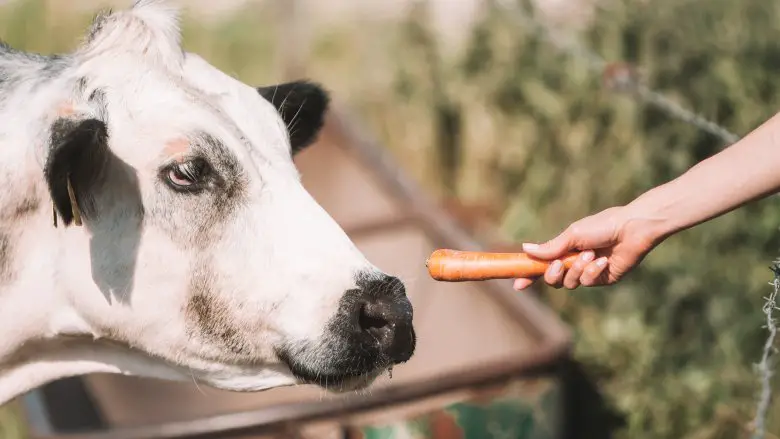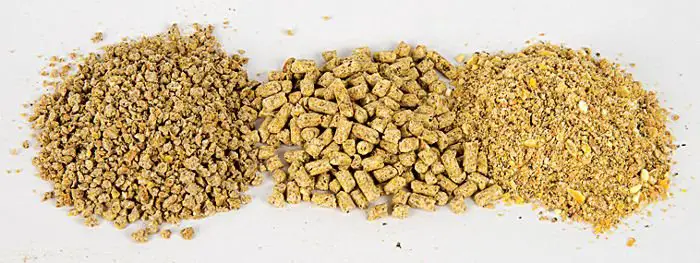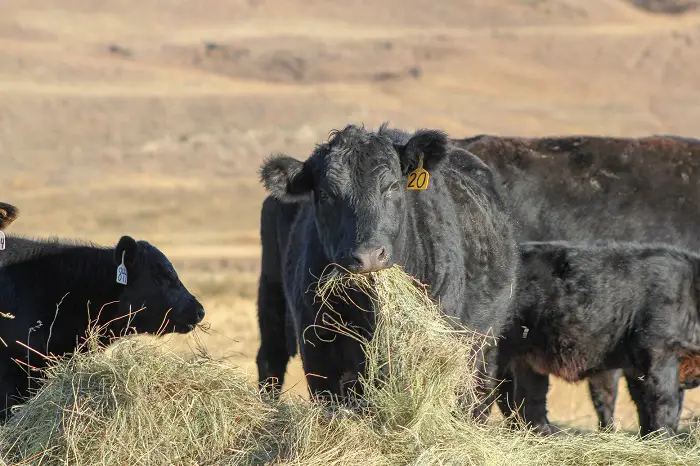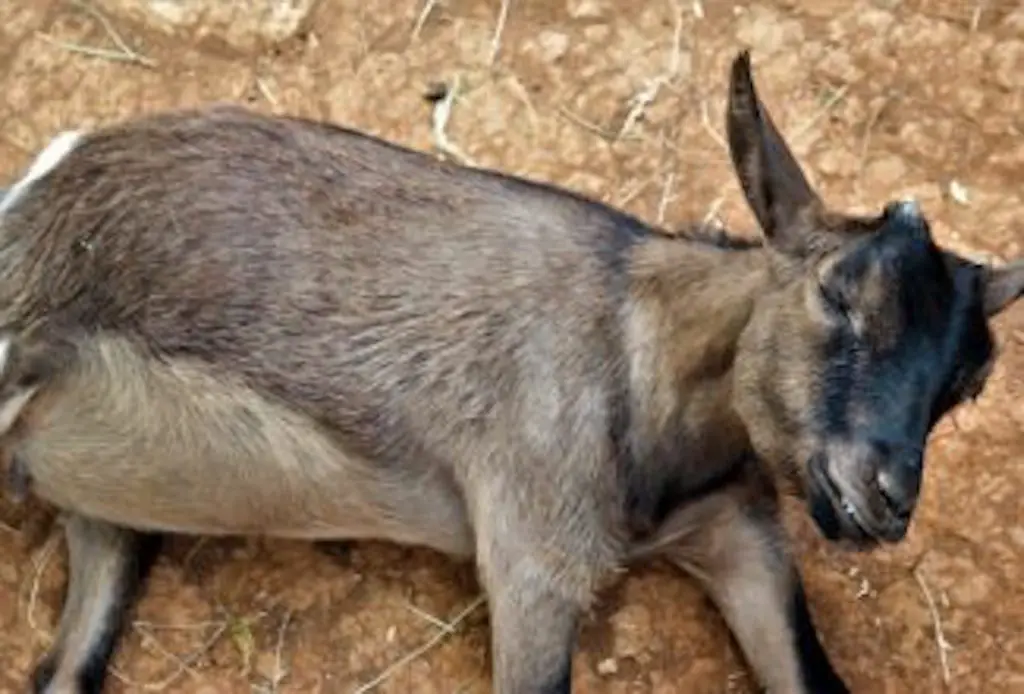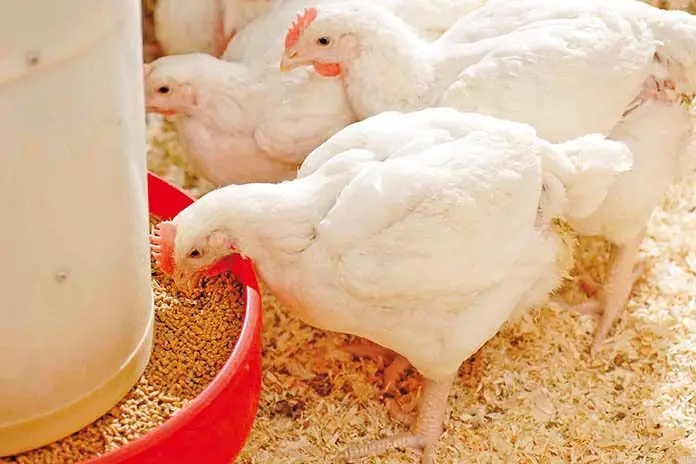There is a long tradition of feeding carrots to farm animals as they are very palatable and nutritious. Carrots are grown predominantly for their roots but could have been originally grown for their seeds and leaves in Persia before being selected and bred specifically for their roots. Carrots are available in many varieties, varying in color and size but their nutritional value for feeding to cows is almost the same. Cows can eat carrots and can be fed carrots successfully fresh, ensiled, or dehydrated without affecting their performance, but should be fed in moderation to avoid scours due to the high moisture content of carrots.
Contents
Typical Nutritional Value of Carrots
Carrots have been bred and selected for a less woody and succulent root crop that is high in the water at about 88% water. Most modern carrot varieties are orange in color which is due to their high carotenoid content in the form of b-carotene. Carrots are very palatable and digestible to cows due to their high carbohydrate and, soluble sugar content mostly in the form of sucrose, this can be a challenge when large amounts of carrots are fed. Carrots can hence be considered an energy feed for cows due to this high carbohydrate and sugar content with an energy digestibility of over 82% and, a metabolizable energy value of almost 12 megajoules per kilogram. Carrots like most root or tuber crops are low in protein although carrots do have a considerably higher protein content than most root crops, averaging 9% protein. The fiber content of the root can be considered moderate averaging 10%, which limits their use a as sole ration for cows, trails have shown that they can be fed up to 40% of the whole diet.
The carrot tops can also be fed to cows as a forage with a modest protein and fiber content, other by-products of carrot processing like carrot juice can also be fed to cows, where available.
Benefits of Feeding Carrots to Cows
Carrots are grown across all regions of the globe, with production estimated at 40 million tons, this means there is a considerable amount of carrots that are available for feeding to cows as in some countries almost half the harvest is discarded. All carrots that are rejected for human consumption can be fed to cows instead of ending up in the waste hence reducing the environmental pollution. Carrots can be used to substitute traditional grains used for cattle feeding as they are high in carbohydrates, which are a good energy source for cows. Carrots can be fed fresh, ensiled, and dehydrated to cows which makes them very versatile as a cow feed for all seasons, utilizing the whole plant. Carrots can also be fed to all classes of cows in significant amounts without affecting their performance.
Challenges of Feeding Carrots to Cows
Carrots have a high moisture content which means that cows fed carrots will consume very little dry matter, hence the need to dehydrate them before feeding if they are going to be used in large quantities. The high moisture content also makes carrots bulky and expensive to transport over long distances. Farmers also need to be careful when buying carrots for feeding cows so as to only buy on a dry matter basis not as is as most of the weight would be water. Carrots are highly palatable and digestible and should be fed to cows in conjunction with good-quality grass or legume hay to avoid scours, acidosis, and bloating. Cows fed large quantities of carrots over a long time have been shown to produce milk and meat with an orange taint due to the carotenoids in the carrot roots. Carrots can contain large amounts of inorganic materials like soil and hence will need to be washed thoroughly before feeding to cows.
How to Feed Carrots to Cows?
Cows like most farm animals can be fed carrots as snacks once in a while without affecting their growth performance or well-being. However, if one decides to feed carrots at a larger scale as part of a complete diet the carrots will need to be washed first to remove all the soil. The carrots can then be chopped up into manageable chunks that prevent choking when combined with other feed ingredients. One also has to check the moisture content of the carrots as this affects the availability of all the other nutrients from the dilution factor of the moisture. Tests for other nutrient contents can also be done so as to help design a complete and balanced diet, especially for cows where performance is of utmost importance like feedlots and dairies.
How Many Carrots Can a Cow Eat?
Studies have shown that carrots can make up to 40% of a cow’s diet and the rest is balanced out by forages that provide fiber like grass and legume hay. Limitations on the amounts of carrots that can be fed are due to their high digestibility and carbohydrate content in the rumen with the potential to cause acidosis a condition that can be lethal to cows. Moderation is key also due to the potential of carrots tainting milk and meat from cows fed carrots.
Conclusion
Cows can eat carrots but should be fed as part of a complete and balanced diet designed for cows with adequate fiber to avoid digestive issues such as acidosis. Carrots can be comparable to grains on a dry matter basis in terms of energy and protein, hence can be used as grain substitutes where they are available at cost-effective prices. The pricing of carrots for cow feeding is something that one has to look at closely before deciding to feed carrots to cows as they can be very expensive. Although carrots have a seasonal availability they can be dehydrated or ensiled together with legumes to provide cow fed for winter feeding where demands for forage are at their highest. Carrots are high in carotenoids which can taint the milk and meat of cows fed large amounts of carrots over a long period, however, they still present a viable option for profitable cattle feeding.
